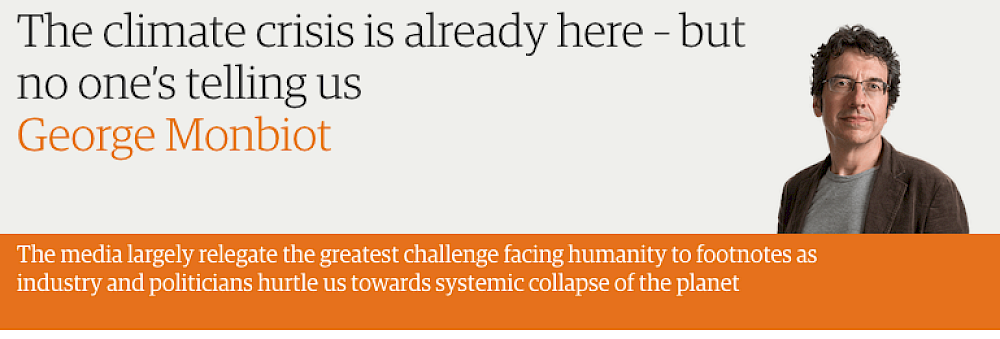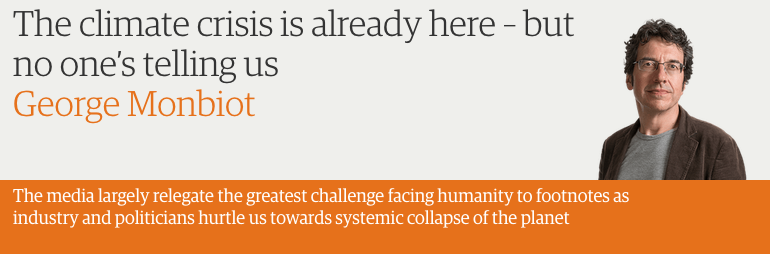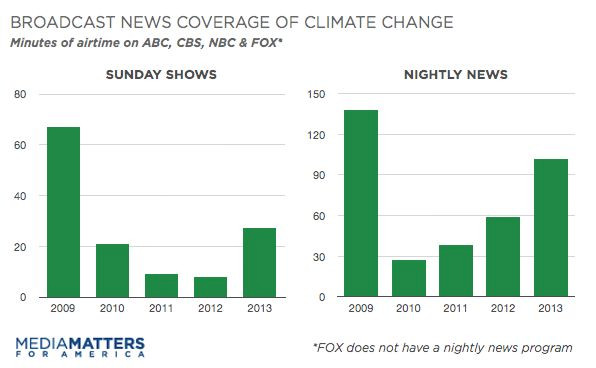Who is to blame for climate change? You might think first of the oil companies. After all, they have known for a long time that their product was harming the planet. Or you might think of various governments, who have shied away from radical measures to reduce dependence on fossil fuel. You might also think of the various corporate interests who have put pressure on politicians not to act, or to delay, or even to deny.
Or you might think of the media.
In a recent article in the Guardian, George Monbiot, one of the leading environmental commentators of the age, does just that. The media misleads us on climate change, he says. That’s when it bothers to report on it at all. It “turns away from the issues that will determine the course of our lives and towards issue of brain-melting irrelevance,” he says.
According to Monbiot, the media reports the effects of climate change as being caused, not by global warming, but by the El Niño effect. The rest of the article is devoted to considerations of the US presidential election campaign, but Monbiot returns to the media to argue that, among the many biases in the media, the bias against relevance is the most important.
How the media reports on climate change is a very active and vibrant field of academic study. How often the media covers climate change, how the coverage is presented, how it varies country to country – all these topics have been considered in depth by scholars in the disciplines of journalism studies, journalism practice, science communication, environmental communication, political communication among others.
I hope to add my tuppence worth with a piece of research on Irish coverage in particular between 2007-2016. As part of my work on this project, I’ve looked at a lot of analysis of media coverage of climate change. And, much as I admire George Monbiot and his work (I’ve been a fan of his Guardian contributions for a long time), I’m not sure I can agree with this particular article.
First of all, the media do report on climate change. Indeed, the opening section of Monbiot’s article features several hyperlinks to media reports of temperature records and extreme weather. A study by Schmidt et al (2014) studied media coverage in 27 countries and found that it was a salient topic in all of them.
For those of us most concerned with climate change and most involved in the climate discourse, such coverage is not enough; but it is there. The problem is that it is not pervasive enough, it does not gain traction. It just doesn’t seem to stick.
Coverage flares up and dies away. International conferences are covered, but there’s no follow-up. Weather is seldom linked to climate change, and, perhaps most crucially, the implications of climate change are not pursued. The days when the media portrayed climate change as not quite a settled scientific issue are long gone, however, and contemporary coverage takes the anthropogenic element of climate change as a given.
When one looks at the threat of climate change on the one hand, and the lack of public engagement or political action on the issue on the other, the disparity is striking. And it is tempting to blame the media for this state of affairs. However, climate change is a “wicked” problem, and the media comprise a complex system.
Here are some of the reasons why the media finds climate change a difficult subject:
- The news media like things that are new, and climate change is essentially the same story over and over again. Climate change is happening by increments, and such events over long timescales are not suited to the news values of the media;
- Climate change is a complex story, covering many different areas of scientific inquiry. It is a multi-faceted story, whereas the news media like single, one-off, discrete events. A murder is the perfect news story: a discrete event with a perpetrator and a victim;
- The news media are in crisis. Their funding model has collapsed. Specialist correspondents are expensive, and fewer and fewer of them are being hired, or retained. Assigning a reporter to a complex story such as climate change instead of a simple, half-day news assignment is a tough call in the current media environment;
- Getting sources for climate change stories is becoming increasingly difficult, even for journalists willing to cover it. Climate scientists are being chased out of the public sphere by trolling on social media and other aggressive tactics;
- It is one of the tragic aspects of climate change that those who have done least to cause it are the ones who are suffering its impacts most. For most Western media, the victims of climate change are different from them and geographically remote. This means they are less likely to be newsworthy.
Dave Robbins is a FuJo member and a lecturer in journalism at DCU. His Two Degrees blog considers politics, media and climate change.
Subscribe to FuJo's newsletter






